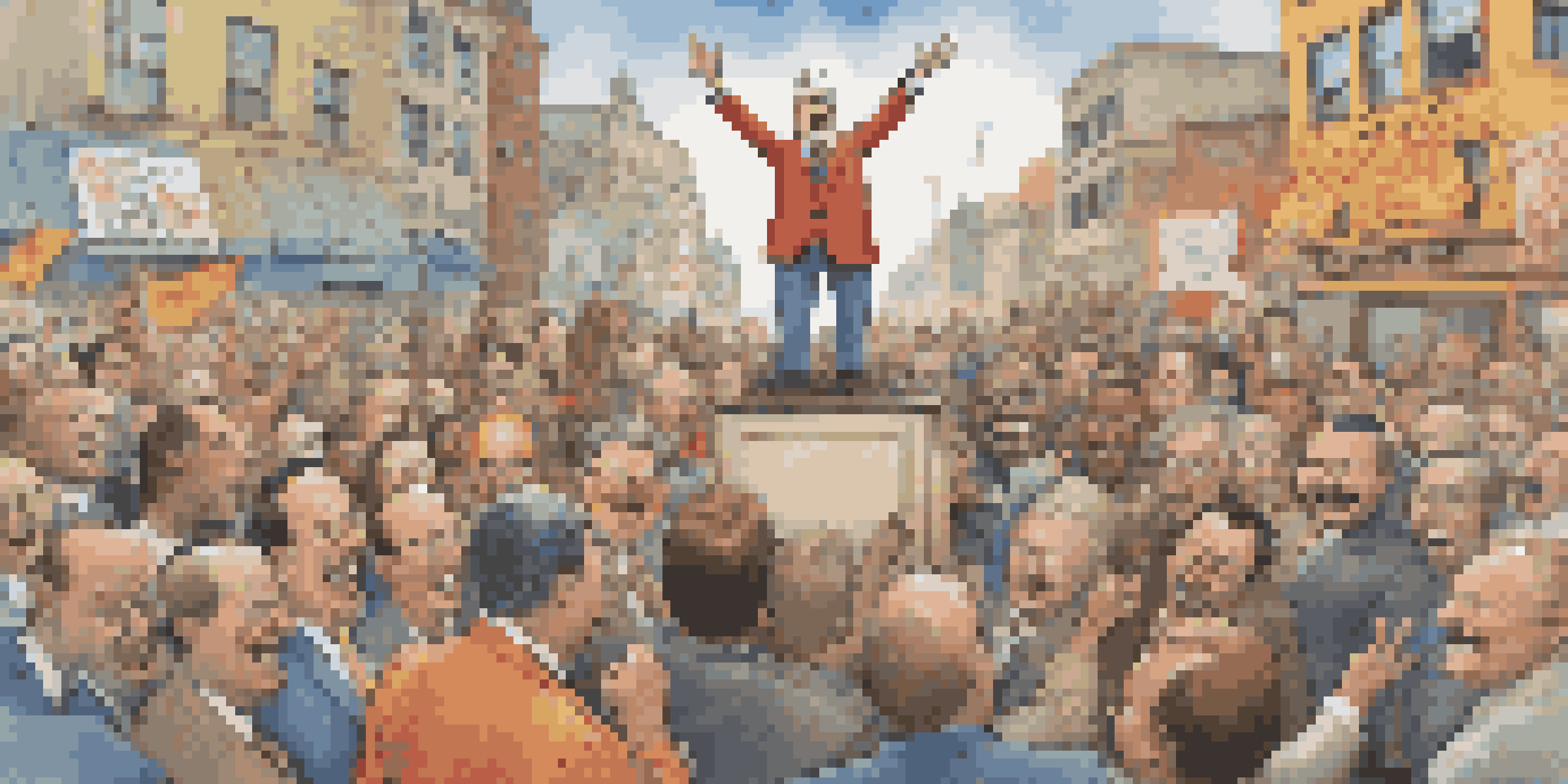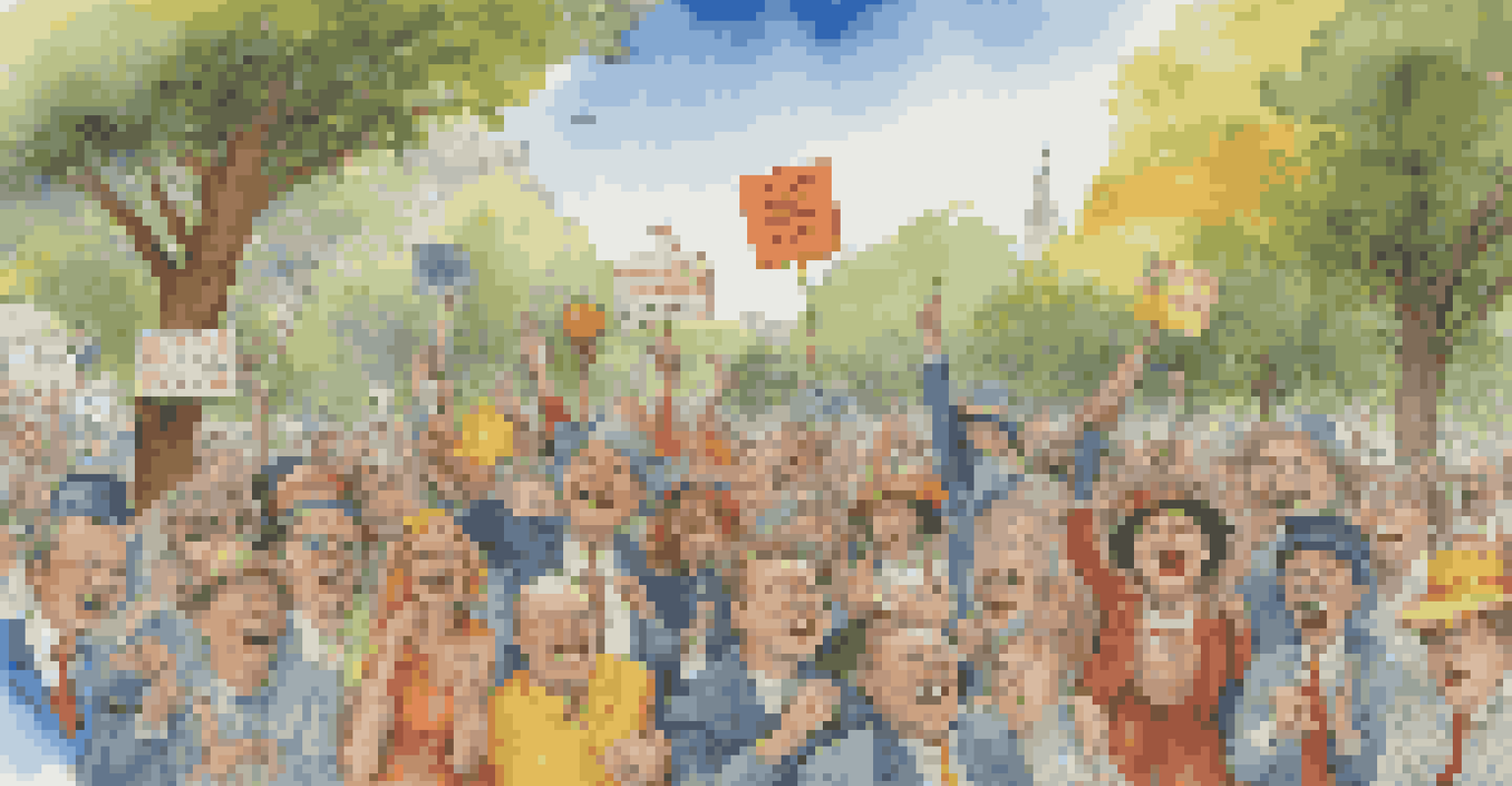The Significance of Satire in Social Change Movements

Understanding Satire: More Than Just Humor
Satire is a powerful literary tool that uses humor, irony, and exaggeration to critique and expose societal issues. By presenting serious topics in a humorous light, satire can make the hard truths more digestible and relatable for the audience. Think of it as a mirror reflecting society’s flaws, often provoking thought and discussion in the process. This blend of entertainment and insight is what makes satire a compelling vehicle for social commentary.
Satire is a sort of mirror, and we can see ourselves in it, and we can see our flaws, and we can see our strengths. It's a wonderful way to provoke thought.
Throughout history, satire has provided a voice for those marginalized by traditional media. Writers and comedians can often tackle sensitive subjects, such as politics or social injustices, with a level of freedom that conventional journalism might not allow. By doing so, they invite audiences to engage with these topics in a more approachable way, leading to greater awareness and understanding. This democratization of discourse is crucial in times of social upheaval.
Moreover, satire often encourages critical thinking by challenging the status quo. It invites audiences to question established norms and the behavior of those in power. This critical lens can spur individuals into action, fostering a sense of urgency that can lead to real-world change. In this way, satire becomes not just a form of entertainment, but a catalyst for social transformation.
Historical Examples of Satirical Impact
Throughout history, satirical works have played pivotal roles in shaping social movements. For instance, the political cartoons of the late 18th century in England highlighted the absurdities of the monarchy and helped fuel the push towards democracy. Similarly, during the Civil Rights Movement, satirical pieces like 'The Onion' and 'Mad Magazine' offered sharp critiques of racial inequalities, often reaching audiences that traditional activism might not have touched.

Another notable example is the use of satire in the Anti-Vietnam War Movement. Comedians like George Carlin and shows like 'Saturday Night Live' used their platforms to ridicule government decisions and policies, effectively mobilizing public sentiment against the war. By making people laugh, they also made them think, fostering a climate where dissent became more acceptable and even mainstream.
Satire as a Social Commentary Tool
Satire uses humor and irony to critique societal issues, making complex topics more relatable and provoking thoughtful discussions.
These historical instances illustrate that satire is not just a passing trend; it has been a formidable force in advocating for change. By engaging the public's emotions and intellect, satirists have pushed boundaries and inspired generations to question authority and demand justice.
Modern Satire: Amplifying Voices in the Digital Age
In today’s digital landscape, satire has found new life through social media platforms. Comedy shows, memes, and viral videos allow satirical content to spread rapidly, reaching millions with just a click. This accessibility is crucial in amplifying voices that might otherwise go unheard, giving rise to grassroots movements and encouraging widespread participation. For example, the #MeToo movement gained momentum partly due to satirical content that highlighted the absurdity of victim-blaming.
The job of satire is to hold power to account, to expose the absurdities of the world, and to challenge the status quo.
Furthermore, platforms like Twitter and TikTok have democratized satire, allowing anyone with a smartphone to create content that can spark conversations around social issues. This shift has led to a more diverse range of voices contributing to the dialogue, ensuring that satire reflects varied perspectives and experiences. The immediacy of digital media means that a single satirical post can go viral, influencing public opinion and even policy in real-time.
However, this rapid dissemination also poses challenges. The line between genuine satire and misinformation can sometimes blur, leading to confusion about what is real and what is exaggerated. Despite this, the role of modern satire in social change remains significant, as it continues to challenge norms and inspire collective action in ways that traditional media may struggle to achieve.
Satire as a Tool for Activism
Activists increasingly leverage satire to draw attention to their causes, using humor as a strategic tool. By packaging serious messages in a light-hearted manner, campaigns can engage wider audiences who might otherwise be indifferent. For instance, organizations like 'The Yes Men' use satirical impersonations of corporate leaders to highlight environmental issues and corporate greed, effectively turning the tables on their targets.
Satirical activism not only entertains but also educates. By framing complex issues in relatable scenarios, it can break down barriers to understanding. For example, satirical skits or parodies about climate change can make the subject matter more relatable, encouraging people to explore the topic further. In essence, humor becomes a gateway to deeper discussions and a call to action.
Historical Impact of Satire
Throughout history, satire has been a powerful force in social movements, shaping public opinion and advocating for change.
Moreover, satire can create a sense of community among activists. Shared laughter in the face of adversity fosters solidarity, reminding individuals that they are not alone in their struggles. This camaraderie can be vital in sustaining movements, providing both motivation and resilience against pushback.
The Risks and Responsibilities of Satire
While satire can be a powerful tool for social change, it comes with inherent risks and responsibilities. The potential for misunderstanding or offending is high, especially in a diverse society where perspectives vary widely. Satirists must navigate the fine line between provoking thought and perpetuating harmful stereotypes, which can undermine their intended message.
Additionally, satire can sometimes lead to complacency rather than action. If audiences view satirical content as merely entertainment, they may fail to engage with the underlying issues. This phenomenon, often referred to as 'performative activism,' can dilute the potency of the satire, turning it into a mere distraction rather than a catalyst for change. It's crucial for satirists to encourage their audiences to translate laughter into action.
Ultimately, the responsibility lies with both the creators and the audience. Satirists must strive for authenticity and thoughtfulness in their work, while audiences should remain discerning, seeking to understand the deeper messages behind the humor. Together, they can ensure that satire remains a force for good in the quest for social change.
The Intersection of Satire and Political Discourse
Satire plays a crucial role in political discourse, shaping how the public perceives political figures and policies. By exposing the absurdities and contradictions within political rhetoric, satirists hold those in power accountable. Shows like 'The Daily Show' and 'Last Week Tonight' have become staples in modern political commentary, using humor to dissect complex issues and encourage civic engagement.
Moreover, satire can serve as a form of protest against authoritarianism and censorship. In countries with repressive regimes, satirical expressions may be one of the few remaining outlets for dissent. For example, satirical publications in places like Russia and Turkey have pushed back against government narratives, often at great personal risk to the creators. This highlights the critical role of satire in preserving freedom of expression.
Modern Satire in the Digital Age
In today’s digital landscape, satire spreads rapidly through social media, amplifying diverse voices and challenging established norms.
However, the intertwining of satire and politics can also lead to polarization. As audiences gravitate toward satirical content that aligns with their beliefs, it can create echo chambers that reinforce existing biases. This underscores the importance of seeking out diverse perspectives within satirical discourse to foster a more nuanced understanding of political issues.
The Future of Satire in Social Change
As society evolves, so too will the role of satire in social change movements. With the ever-growing influence of technology, we can expect to see new forms of satire emerge, adapting to the changing landscape of communication. Virtual reality experiences, interactive content, and AI-generated satire could offer fresh avenues for engagement, making the art of critique more immersive and impactful.
Moreover, as social issues become increasingly complex, the need for insightful satire will remain paramount. The challenges of misinformation and polarized views necessitate a form of satire that not only entertains but also enlightens. Creators will need to balance humor with empathy, ensuring that their work resonates with diverse audiences and encourages constructive dialogue.

Ultimately, the future of satire in social change will depend on its ability to connect with people on a human level. By maintaining authenticity and a genuine desire to provoke thought, satire can continue to be a powerful ally in the fight for justice and equality, inspiring individuals to take action and effect real change in their communities.